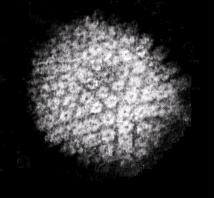Drugs targeting herpes simplex virus (HSV), the agent that causes cold  sores, might also abate Alzheimer's, new research has shown.
sores, might also abate Alzheimer's, new research has shown.
Previous research has tied HSV to dementing diseases like Alzheimer's since scientists showed that the DNA of the virus crops up in the brain in the same spots as the beta-amyloid plaques and neurofibrillary tangles that characterise the condition in the brain. HSV-infected neurones also make more of the enzymes and proteins that produce these pathological hallmarks of the disease. But with 80% of people testing positive for herpes simplex infection, it was unclear what, if anything, doctors could do to reduce the risk of Alzheimer's, which currently afflicts about 18 million sufferers worldwide.
Now, Manchester University scientist Ruth Itzhaki has shown that treatment with the safe antiviral agent aciclovir can, in the dish at least, reduce the rate of beta-amyloid formation, thereby mitigating the risk of Alzheimer's. By using a variety of mutant viruses lacking key genes, Itzhaki and her colleagues were able to interrupt the growth of the virus at different stages of its infectious cycle to discover what aspects of viral replication might increase beta-amyloid production. DNA synthesis - when the virus copies its DNA code - they found, appears to be the critical step. Luckily this is the very stage that is targeted by anti-herpes drugs like aciclovir and, sure enough, treating the cells with this agent reduced the rate of production of the tangle-forming proteins and, indirectly, beta-amyloid also.
The results are based only on an in-vitro study, but suggest, given the safety and relative low cost of aciclovir, that a clinical trial is warranted to explore whether antivirals can cut dementia rates in the elderly. As the scientists themselves point out, although a high fraction of the population carry HSV infection for life, in the majority the virus remains in the peripheral nervous system. It's chiefly in the elderly that the virus appears to invade the brain. Therefore, antiviral agents could arrest this process and reduce the risk of progression to Alzheimer's.










Comments
Add a comment